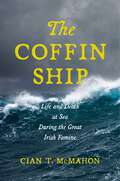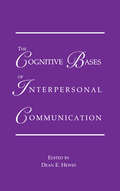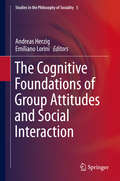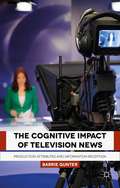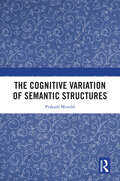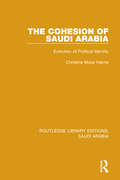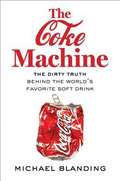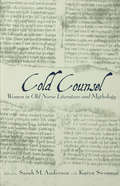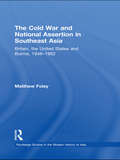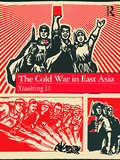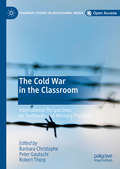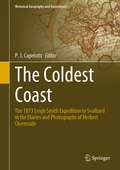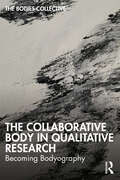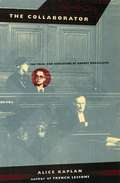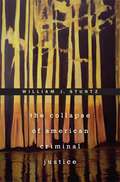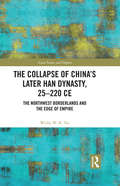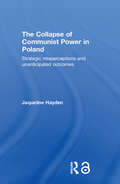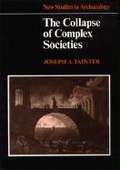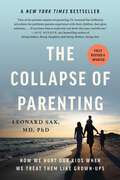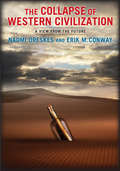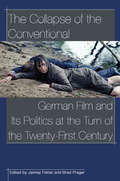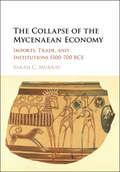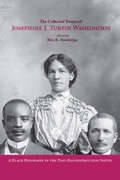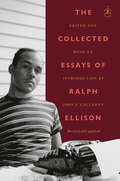- Table View
- List View
The Coffin Ship: Life and Death at Sea during the Great Irish Famine (The Glucksman Irish Diaspora Series #4)
by Cian T. McMahonChoice Outstanding Academic Title 2022Honorable Mention, Theodore Saloutos Book Award, given by the Immigration and Ethnic History SocietyA vivid, new portrait of Irish migration through the letters and diaries of those who fled their homeland during the Great FamineThe standard story of the exodus during Ireland’s Great Famine is one of tired clichés, half-truths, and dry statistics. In The Coffin Ship, a groundbreaking work of transnational history, Cian T. McMahon offers a vibrant, fresh perspective on an oft-ignored but vital component of the migration experience: the journey itself.Between 1845 and 1855, over two million people fled Ireland to escape the Great Famine and begin new lives abroad. The so-called “coffin ships” they embarked on have since become infamous icons of nineteenth-century migration. The crews were brutal, the captains were heartless, and the weather was ferocious. Yet the personal experiences of the emigrants aboard these vessels offer us a much more complex understanding of this pivotal moment in modern history. Based on archival research on three continents and written in clear, crisp prose, The Coffin Ship analyzes the emigrants’ own letters and diaries to unpack the dynamic social networks that the Irish built while voyaging overseas. At every stage of the journey—including the treacherous weeks at sea—these migrants created new threads in the worldwide web of the Irish diaspora.Colored by the long-lost voices of the emigrants themselves, this is an original portrait of a process that left a lasting mark on Irish life at home and abroad. An indispensable read, The Coffin Ship makes an ambitious argument for placing the sailing ship alongside the tenement and the factory floor as a central, dynamic element of migration history.
The Cognitive Bases of Interpersonal Communication (Routledge Communication Series)
by Dean E. HewesOur interpretations of the world we live in, and the people and institutions that comprise it, are acquired through complex interactions among what we believe to be true, what the world is, and/or what others think it is. Understanding those complex interactions is one of the most important goals of the social sciences. Of the many disciplines that have contributed to that understanding, two take center stage in this book -- psychology and communication. This volume's purpose is to reconnect the partially isolated environments of social psychology and communication. To do so, it utilizes four building blocks: * the cognitive foundations of interpersonal communication as it might be studied from a social psychological perspective * insiders' views of interpersonal communication from a cognitive psychological standpoint * insiders' approaches to interpersonal communication from an AI perspective * a critique of the cognitive enterprise that reflects the strong philosophical grounding of communication. Overall, the chapters typify some of the most interesting cognitive work done in the study of interpersonal communication. As such, the book should promote productive dialogue across disciplinary boundaries and stimulate further work within the field of interpersonal communication.
The Cognitive Foundations of Group Attitudes and Social Interaction
by Andreas Herzig Emiliano LoriniThis book offers a widely interdisciplinary approach to investigating important questions surrounding the cognitive foundations of group attitudes and social interaction. The volume tackles issues such as the relationship between individual and group attitudes, the cognitive bases of group identity and group identification and the link between emotions and individual attitudes. This volume delves into the links between individual attitudes (such as beliefs, goals and intentions) and how they are reflected in shared attitudes where common belief, collective acceptance, joint intentions, and group preferences come into play. It pursues answers to the connections between trust and beliefs, goals and intentions and attempts to investigate questions such as: does trust have an affective component and how it may relate to hope and fear? The volume also scrutinizes game theory and questions whether it can satisfactorily explain and model social interaction and if there may be any concepts which are not addressed by the current theory. Contributors are derived from disciplines including philosophy, economics, psychology, logic and computer science. Interdisciplinary in scope and comprehensive detail, this volume integrates a variety of approaches - philosophical, psychological and artificial intelligence - to strategic, normative and emotional aspects of social interaction.
The Cognitive Impact of Television News
by Barrie GunterResearch shows that, while people around the world consistently nominate television as their most important news source, much of the content of news bulletins is lost to viewers within moments. In response, Barrie Gunter argues that this can be explained by the way in which televised news is written, packaged and presented.
The Cognitive Variation of Semantic Structures
by Prakash MondalThis book explores the cognitive constraints and principles of variation in structures of linguistic meaning across languages. It unifies cognitive-semantic representations with formal-semantic representations to make a unique contribution to the study of typological generalizations and universals in natural language semantics. This unified approach not only helps reveal why semantic structures have the observed variation they have but also sheds light on the compelling cognitive and formal regularities and patterns in the variation of linguistic semantics. The book also advances the general principles of a cognitively oriented semantic typology.Lucid and topical, the book will be an indispensable resource for students and researchers of language typology, linguistics, cognitive linguistics and semantics. It will also be of interest to theoretical linguists of both cognitivist and formalist schools.
The Cohesion of Saudi Arabia: Evolution of Political Identity (Routledge Library Editions: Saudi Arabia Ser. #2)
by Christine HelmsSaudi Arabia is no longer regarded as quite the invincible pillar of Islam it so recently seemed. Its authority within the Islamic world has been challenged by the Ayatollahs in Iran and its dominant position within Opec has been seriously eroded. Most importantly, the dramatic assault on the Mosque at Mecca has raised serious doubts about the internal security of the Saudi regime. This study provides essential background to the contemporary problems of Saudi Arabia in its focus on the early years of the Saudi state and the way in which King Abd al-Aziz first created a nation state and asserted his family's authority. It agues that the geography of Central Arabia was a crucial factor in determining how he fused together the Bedouin tribes and the settled communities into a political entity. First published in 1981 and based on extensive new research data, this is the first study to examine more than simply a political or diplomatic history of Saudi Arabia, and concerns itself with the attitudes and perceptions of the Arabs themselves towards political initiatives of that period.
The Coke Machine
by Michael BlandingThe Coke Machine takes readers deep inside The Coca-Cola Company and its international franchisees to reveal how they became the number one brand in the world, and how far they'll go to stay there. Ever since its "I'd like to teach the world to sing" commercials from the 1970s, Coca-Cola has billed itself as the world's beverage, a formula that has made it one of the most profitable companies on the planet and "Coca-Cola" the world's second most recognized word after "hello." however, as the company expands its reach, an increasing number of the world's citizens are finding the taste of coke more bitter than sweet. The Coke Machine probes shocking accusations about the company's global impact, including: coca-cola's history of winning at any cost, even if it meant that its franchisees were making deals with the Nazis and Guatemalan paramilitary squads the horrific environmental impact of coke bottling plants in India and Mexico that coke bottlers stand accused of conspiring with paramilitaries to threaten, kidnap, and murder union leaders in their bottling plants in Colombia The Coke Machine is the first comprehensive probe of the company and its secret formula for greed.
The Cold Counsel: The Women in Old Norse Literature and Myth
by Sarah M. Anderson Karen SwensonCold Counsel is the only collection devoted to the place of women in Old Norse literature and culture. It draws upon the disciplines of history, sociology, feminism, ethnography and psychoanalysis in order to raise fresh questions about such new subjects as gender, class, sexuality, family structure and ideology in medieval Iceland.
The Cold War and National Assertion in Southeast Asia: Britain, the United States and Burma, 1948–1962 (Routledge Studies in the Modern History of Asia)
by Matthew FoleyThis book charts British and American approaches to Burma between the country’s independence from the United Kingdom in 1948 and the military coup that ended civilian government in 1962. It analyses the fundamental drivers of Anglo-American policy-making during this crucial period – assumptions, expectations and apprehensions that would, eventually, lead America into the disaster of Vietnam. The book suggests the key to understanding British and American approaches to Southeast Asia is to see them in terms of a search for order and stability in an increasingly chaotic and dangerous world. Such order had previously been provided by the colonial regimes of the European powers. With those regimes gone or going, British and American planners faced a region beset with new uncertainties, led by a set of nationalist politicians driven by very different, and often competing, goals and aspirations. A detailed case study of post-colonial transition in Asia in the context of the emerging Cold War, this book focuses on the retraction of European colonial power in Southeast Asia, the concomitant expansion of US engagement in the region and the broad processes underpinning these changes. It draws on unique, previously unpublished British and American archival material relating to the Burmese case and fills an important gap in historical understanding of Western engagement in Southeast Asia.
The Cold War and the Color Line: American Race Relations in the Global Arena
by Thomas BorstelmannAfter World War II the United States faced two preeminent challenges: how to administer its responsibilities abroad as the world's strongest power, and how to manage the rising movement at home for racial justice and civil rights. The effort to contain the growing influence of the Soviet Union resulted in the Cold War, a conflict that emphasized the American commitment to freedom. The absence of that freedom for nonwhite American citizens confronted the nation's leaders with an embarrassing contradiction. Racial discrimination after 1945 was a foreign as well as a domestic problem. World War II opened the door to both the U.S. civil rights movement and the struggle of Asians and Africans abroad for independence from colonial rule. America's closest allies against the Soviet Union, however, were colonial powers whose interests had to be balanced against those of the emerging independent Third World in a multiracial, anticommunist alliance. At the same time, U.S. racial reform was essential to preserve the domestic consensus needed to sustain the Cold War struggle. The Cold War and the Color Line is the first comprehensive examination of how the Cold War intersected with the final destruction of global white supremacy. Thomas Borstelmann pays close attention to the two Souths--Southern Africa and the American South--as the primary sites of white authority's last stand. He reveals America's efforts to contain the racial polarization that threatened to unravel the anticommunist western alliance. In so doing, he recasts the history of American race relations in its true international context, one that is meaningful and relevant for our own era of globalization.
The Cold War in East Asia
by Xiaobing LiThis textbook provides a survey of East Asia during the Cold War from 1945 to 1991. Focusing on the persistence and flexibility of its culture and tradition when confronted by the West and the US, this book investigates how they intermesh to establish the nations that have entered the modern world. Through the use of newly declassified Communist sources, the narrative helps students form a better understanding of the origins and development of post-WWII East Asia. The analysis demonstrates how East Asia’s position in the Cold War was not peripheral but, in many key senses, central. The active role that East Asia played, ultimately, turned this main Cold War battlefield into a "buffer" between the United States and the Soviet Union. Covering a range of countries, this textbook explores numerous events, which took place in East Asia during the Cold War, including: The occupation of Japan, Civil war in China and the establishment of Taiwan, The Korean War, The Vietnam War, China’s Reforming Movement. Moving away from Euro-American centric approaches and illuminating the larger themes and patterns in the development of East Asian modernity, The Cold War in East Asia is an essential resource for students of Asian History, the Cold War and World History.
The Cold War in the Classroom: International Perspectives on Textbooks and Memory Practices (Palgrave Studies in Educational Media)
by Barbara Christophe Peter Gautschi Robert ThorpThis book is open access under a CC BY 4.0 license.This book explores how the socially disputed period of the Cold War is remembered in today’s history classroom. Applying a diverse set of methodological strategies, the authors map the dividing lines in and between memory cultures across the globe, paying special attention to the impact the crisis-driven age of our present has on images of the past. Authors analysing educational media point to ambivalence, vagueness and contradictions in textbook narratives understood to be echoes of societal and academic controversies. Others focus on teachers and the history classroom, showing how unresolved political issues create tensions in history education. They render visible how teachers struggle to handle these challenges by pretending that what they do is ‘just history’. The contributions to this book unveil how teachers, backgrounding the political inherent in all memory practices, often nourish the illusion that the history in which they are engaged is all about addressing the past with a reflexive and disciplined approach.
The Coldest Coast: The 1873 Leigh Smith Expedition to Svalbard in the Diaries and Photographs of Herbert Chermside (Historical Geography and Geosciences)
by Grenna MuseumThis book describes the 1873 voyage of the British explorer Benjamin Leigh Smith, based on the diaries and photographs of Lieutenant Herbert C. Chermside, who joined the expedition of the seas around Svalbard. Chermside’s photographs, long believed lost, have recently been uncovered in Sweden and are being curated there by the Grenna Museum. The three unpublished diaries of Herbert Chermside were lent to the Scott Polar Research Institute in 1939 by Mrs. Benjamin Leigh Smith. For the first time, Chermside’s diaries are published in their entirety, with the original photographs shown alongside modern images of the same locations. This includes the first photographic record of the north coast of Svalbard, images that are today being used as comparative data for the study of climate change in the archipelago.The diaries have been fully transcribed and edited. Introductory chapters are included, written by specialists in the history of exploration, history of science, and the history of photography from Penn State University, the University of Gothenburg, and UiT, the Arctic University of Norway, as well as contributors from the UK and Germany.This volume is published in association with Grenna Museum, which will present Chermside’s photographs in a 2022 exhibit on Leigh Smith and A.E. Nordenskiold.
The Collaborative Body in Qualitative Research: Becoming Bodyography
by Davina Kirkpatrick Sarah Helps Bodies Collective Ryan Bittinger Claudia Canella Jess Erb Mark Huhnen Alys MendusThe Collaborative Body in Qualitative Research challenges normative philosophies that have frequently neglected the body’s place in research and then illustrates how the body is essential for all meaning making. By ‘voicing the body’, the first part of this rebellious book problematizes how the body is used/assessed, yet often silenced in academic writing. This book then fluidly moves to celebrating the body through discussing taboo topics like sex/sexuality in friendship, underwear (knickers), ageing, and death, as well as how a non-binary body moves in a heteronormative world. Through the lens of Bodyography, this book does research differently – illuminating how the body flourishes, excites knowledge, and is complicated when placed on a ‘screen’. This book celebrates a collaborative and arts-based approach. This book is a dialogue between The Bodies Collective, with dialogic resonance sections between each chapter and art pieces throughout. This book will encourage all scholars to do research differently. Anyone with a thirst to challenge normative practices in academia and who wants research to be inspiring and playful will fall in love with this book.
The Collaborator: The Trial & Execution of Robert Brasillach
by Alice KaplanOn February 6, 1945, Robert Brasillach was executed for treason by a French firing squad. He was a writer of some distinction—a prolific novelist and a keen literary critic. He was also a dedicated anti-Semite, an acerbic opponent of French democracy, and editor in chief of the fascist weekly Je Suis Partout, in whose pages he regularly printed wartime denunciations of Jews and resistance activists. Was Brasillach in fact guilty of treason? Was he condemned for his denunciations of the resistance, or singled out as a suspected homosexual? Was it right that he was executed when others, who were directly responsible for the murder of thousands, were set free? Kaplan's meticulous reconstruction of Brasillach's life and trial skirts none of these ethical subtleties: a detective story, a cautionary tale, and a meditation on the disturbing workings of justice and memory, The Collaborator will stand as the definitive account of Brasillach's crime and punishment. A National Book Award Finalist A National Book Critics Circle Award Finalist "A well-researched and vivid account. "—John Weightman, New York Review of Books "A gripping reconstruction of [Brasillach's] trial. "—The New Yorker "Readers of this disturbing book will want to find moral touchstones of their own. They're going to need them. This is one of the few works on Nazism that forces us to experience how complex the situation really was, and answers won't come easily. "—Daniel Blue, San Francisco Chronicle Book Review "The Collaborator is one of the best-written, most absorbing pieces of literary history in years. "—David A. Bell, New York Times Book Review "Alice Kaplan's clear-headed study of the case of Robert Brasillach in France has a good deal of current-day relevance. . . . Kaplan's fine book . . . shows that the passage of time illuminates different understandings, and she leaves it to us to reflect on which understanding is better. "—Richard Bernstein, The New York Times
The Collapse of American Criminal Justice
by William J. StuntzRule of law has vanished in America's criminal justice system. Prosecutors decide whom to punish; most accused never face a jury; policing is inconsistent; plea bargaining is rampant; and draconian sentencing fills prisons with mostly minority defendants. A leading criminal law scholar looks to history for the roots of these problems - and solutions.
The Collapse of China's Later Han Dynasty, 25-220 CE: The Northwest Borderlands and the Edge of Empire (Asian States and Empires)
by Wicky W. TseIn the Later Han period the region covering the modern provinces of Gansu, southern Ningxia, eastern Qinghai, northern Sichuan, and western Shaanxi, was a porous frontier zone between the Chinese regimes and their Central Asian neighbours, not fully incorporated into the Chinese realm until the first century BCE. Not surprisingly the region had a large concentration of men of martial background, from which a regional culture characterized by warrior spirit and skills prevailed. This military elite was generally honoured by the imperial centre, but during the Later Han period the ascendancy of eastern-based scholar-officials and the consequent increased emphasis on civil values and de-militarization fundamentally transformed the attitude of the imperial state towards the northwestern frontiersmen, leaving them struggling to achieve high political and social status. From the ensuing tensions and resentment followed the capture of the imperial capital by a northwestern military force, the deposing of the emperor and the installation of a new one, which triggered the disintegration of the empire. Based on extensive original research, and combining cultural, military and political history, this book examines fully the forging of military regional identity in the northwest borderlands and the consequences of this for the early Chinese empires.
The Collapse of Communist Power in Poland: Strategic Misperceptions and Unanticipated Outcomes (BASEES/Routledge Series on Russian and East European Studies #Vol. 26)
by Jacqueline HaydenBased on extensive original research, including interviews with key participants, this book investigates the sudden and unforeseen collapse of communist power in Poland in 1989. It sets out the sequence of events, and examines the strategies of the various political groupings prior to the partially free election of June 1989. This volume argues that the specific negotiating strategies adopted by the communist party representatives in the Round Table discussions before the elections was a key factor in communism’s collapse. The book shows that on many occasions, PZPR decision-makers ignored expert advice, and many Round Table bargains went against the party’s best interests. Using in-depth interviews with major party players, including General Jaruzelski, General Kiszczak and Mieczyslaw Rakowski, as well as Solidarity advisors such as Adam Michnik, the text provides a unique source of first-hand accounts of Poland’s revolutionary drama.
The Collapse of Complex Societies
by Joseph A. TainterAny explanation of political collapse carries lessons not just for the study of ancient societies, but for the members of all complex societies in both the present and future. Dr. Tainter describes nearly two dozen cases of collapse and reviews more than 2000 years of explanations. He then develops a new and far-reaching theory that accounts for collapse among diverse kinds of societies, evaluating his model and clarifying the processes of disintegration by detailed studies of the Roman, Mayan and Chacoan collapses.
The Collapse of Parenting: How We Hurt Our Kids When We Treat Them Like Grown-Ups
by Leonard SaxIn this New York Times bestseller, one of America&’s premier physicians offers a must-read account of the new challenges facing parents today and a program for how we can better prepare our children to navigate the obstacles they face In The Collapse of Parenting, internationally acclaimed author Leonard Sax argues that rising levels of obesity, depression, and anxiety among young people can be traced to parents abdicating their authority. The result is children who have no standard of right and wrong, who lack discipline, and who look to their peers and the Internet for direction. Sax shows how parents must reassert their authority - by limiting time with screens, by encouraging better habits at the dinner table, and by teaching humility and perspective - to renew their relationships with their children. Drawing on nearly thirty years of experience as a family physician and psychologist, along with hundreds of interviews with children, parents, and teachers, Sax offers a blueprint parents can use to help their children thrive in an increasingly complicated world.
The Collapse of Western Civilization: A View from the Future
by Naomi Oreskes Erik ConwayThe year is 2393, and the world is almost unrecognizable. Clear warnings of climate catastrophe went ignored for decades, leading to soaring temperatures, rising sea levels, widespread drought and—finally—the disaster now known as the Great Collapse of 2093, when the disintegration of the West Antarctica Ice Sheet led to mass migration and a complete reshuffling of the global order. Writing from the Second People's Republic of China on the 300th anniversary of the Great Collapse, a senior scholar presents a gripping and deeply disturbing account of how the children of the Enlightenment—the political and economic elites of the so-called advanced industrial societies—failed to act, and so brought about the collapse of Western civilization. In this haunting, provocative work of science-based fiction, Naomi Oreskes and Eric M. Conway imagine a world devastated by climate change. Dramatizing the science in ways traditional nonfiction cannot, the book reasserts the importance of scientists and the work they do and reveals the self-serving interests of the so called "carbon combustion complex" that have turned the practice of science into political fodder. Based on sound scholarship and yet unafraid to speak boldly, this book provides a welcome moment of clarity amid the cacophony of climate change literature.
The Collapse of the Conventional: German Film and Its Politics at the Turn of the Twenty-First Century
by Brad Prager Jaimey FisherAnalyzes a diverse body of films and investigates the renaissance that has taken place in German cinema since the turn of the twenty-first century.
The Collapse of the Mycenaean Economy: Imports, Trade, and Institutions 1300–700 BCE
by Sarah C. MurrayIn this book, Sarah Murray provides a comprehensive treatment of textual and archaeological evidence for the long-distance trade economy of Greece across 600 years during the transition from the Late Bronze to the Early Iron Age. <P><P>Analyzing the finished objects that sustained this kind of trade, she also situates these artifacts within the broader context of the ancient Mediterranean economy, including evidence for the import and export of commodities as well as demographic change. Murray argues that our current model of exchange during the Late Bronze Age is in need of a thoroughgoing reformulation. <P><P> She demonstrates that the association of imported objects with elite self-fashioning is not supported by the evidence from any period in early Greek history. Moreover, the notional 'decline' in trade during Greece's purported Dark Age appears to be the result of severe, economic contraction, rather than a severance of access to trade routes.
The Collected Essays of Josephine J. Turpin Washington: A Black Reformer in the Post-Reconstruction South
by Josephine Turpin WashingtonNewspaper journalist, teacher, and social reformer, Josephine J. Turpin Washington led a life of intense engagement with the issues facing African American society in the post-Reconstruction era. This volume recovers numerous essays, many of them unavailable to the general public until now, and reveals the major contributions to the emerging black press made by this Virginia-born, Howard University-educated woman who clerked for Frederick Douglass and went on to become a writer with an important and unique voice.Written between 1880 and 1918, the work collected here is significant in the ways it disrupts the nineteenth-century African American literary canon, which has traditionally prioritized slave narratives. It paves the way for the treatment of race and gender in later nineteenth-century African American novels, and engages Biblical scriptures and European and American literatures to support racial uplift ideology. It also articulates shrewdly the aesthetic needs and responsibilities necessary for the black press to establish a reputable literary sphere.Part of a vibrant movement in recent scholarship to reclaim writings of nineteenth-century African American women writers, this expertly edited and annotated collection represents not only a valuable scholarly resource but a powerful example of the determination of a southern black woman to inspire others to improve their own lives and those of all African Americans.
The Collected Essays of Ralph Ellison (Modern Library Classics)
by Ralph EllisonCompiled, edited, and newly revised by Ralph Ellison’s literary executor, John F. Callahan, this Modern Library Paperback Classic includes posthumously discovered reviews, criticism, and interviews, as well as the essay collections Shadow and Act (1964), hailed by Robert Penn Warren as “a body of cogent and subtle commentary on the questions that focus on race,” and Going to the Territory (1986), an exploration of literature and folklore, jazz and culture, and the nature and quality of lives that black Americans lead. “Ralph Ellison,” wrote Stanley Crouch, “reached across race, religion, class and sex to make us all Americans.”
